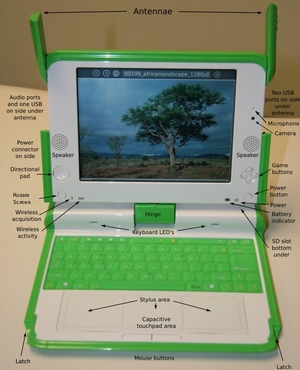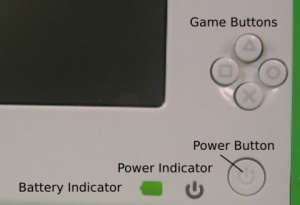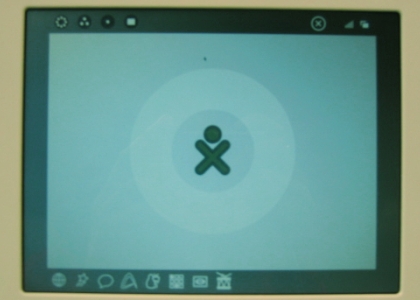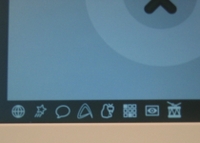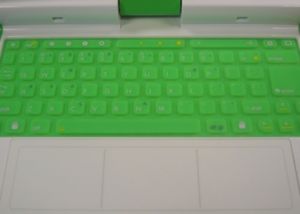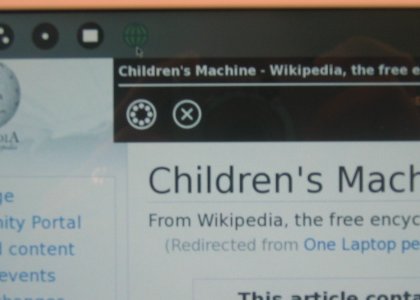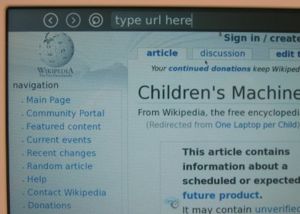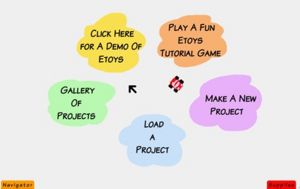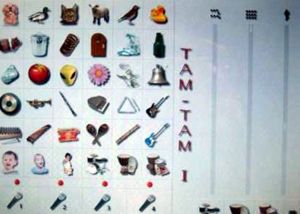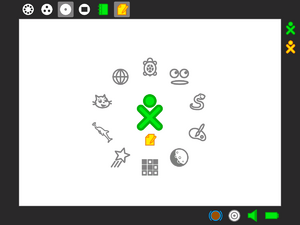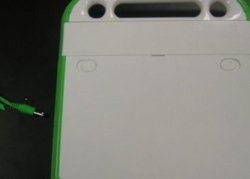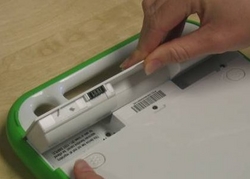Demo notes/lang-ja
| 翻訳された Demo Notes | 原文 |
| Demo Notes/translations +/- | 変更 |
- This is an on-going translation
This page describes demonstration instructions and common bugs and fixes for B1 and B2 laptops.
IMPORTANT
Please note that this is a Beta unit with an Alpha software load. There are bugs that are currently being worked on and not all components are operational, e.g., some keys do not work. We will do our best to document these and get them fixed in a timely manner.
- The touch pad is sensitive and can be hard to maneuver until you get used to it. (It needs tuning.)
- When you click on an icon, please click only ONCE or the application will load many times. Sometimes applications are slow to load. BE PATIENT.
- Static is an issue with these units, please use static guard around demo areas to reduce static from carpet.
- We have yet to implement power management, so keep the machine plugged in as much as possible.
More detail is available online at http://wiki.laptop.org/go/BTest_Software_Notes.
An overview of the machine
Getting Started
Opening the laptop
Position the handle away from you and lift both antennae up and toward you until the laptop clicks open. Lift the screen up from the keyboard; you may have to hold the keyboard down as you lift up on the display.
Power on
The Power Button is located in the bottom right-hand corner of the bezel surrounding the screen. Note that it takes approximately two minutes for the machine to boot. However, the green power LED should come on immediately. If, for some reason, you do not see text appear on the screen within 15 seconds, or if the machine does not power on at all, please see the #Bugs and or Known Issues Section at the end of this document. (Note that sometimes the power button gets caught under the bezel.)
Power off
Update
There is no longer a shut down mode, just power the device off by using the power button when you want to turn it off.
The Frame and the icons
Bring up the Frame onto the screen by pushing the ![]() key (an “empty rectangle” on it) on the upper right-hand corner of the keyboard or by moving the cursor to any corner of the screen (aka 'Hot Corners').
key (an “empty rectangle” on it) on the upper right-hand corner of the keyboard or by moving the cursor to any corner of the screen (aka 'Hot Corners').
Top-left icons (places)
- Circle with 8 dots: This icon shows you the entire Neighborhood. Brings up all users available on the mesh network;
- Circle with 3 dots: This icon takes you to your Friends/Groups view. Shows all users on mesh network that you have identified as friends;
- Circle with 1 dot: This icon takes you to your Home screen;
- Circle with rectangle: This icon takes you back to the Activity you were working on.
Top-right icons (status)
Update: On Build 303+ only the bulletin-board icon is in the upper-right of the frame.
Bottom-left icons (actions)
Different builds have different collections of activities. You should see something along the lines of the following:
- Globe: This icon starts the web browser;
- Shooting Star: This icon starts the Etoys activity;
- Speaking Bubble: This icon starts the chat activity;
- Abstract A: This icon starts the text editor;
- Penguin in front of the TV: This icon starts the RSS-feed reader;
- 3×3 Matrix: This icon starts the Memosono game;
- Eye: This icon starts the camera;
- Drum: This icon start the Tam Tam activity.
Other activities include BlockParty, an ebook reader, a slideshow viewer...
The Keyboard
The center part of the touchpad can be used as a pointing device. The entire surface can be used with a stylus.
Demo instructions
Patience is very important: the user interface does not yet tell you that it is busy starting activities, and we have just begun performance work. You are using alpha test software.
Demo Suite:
- Web Browsing
- Etoys
- Memosono Game
- Tam Tam
- Dual resolution monitor
- eBook and Camera
- Chat
Home screen

After you turn on the laptop you will come directly to the Home screen.
To begin, bring up the Frame by pushing the “Frame” ![]() key on the upper-right corner of the keyboard.
key on the upper-right corner of the keyboard.
The Network
As many demos use the network (browser, RSS feed, mesh demos), before you begin, the laptop should be associated with a network. The laptop should be able to access any wireless networks in the area.
Click on the network icon (five bars on the upper-right of the Frame). A list of available wireless networks will show up in a drop down menu.
If you cannot see any networks, it may be because the embedded control did not properly initialize the USB ports (the network controller is a USB device)—you will need to reboot.
Switching between activities
You can have multiple activities running at once—moving between them by returning to the Home view (key with one dot—![]() ) and then clicking on an activity that you'd like to go to.
) and then clicking on an activity that you'd like to go to.
Exiting Activities
To exit an activity, click on the Frame ![]() key to bring up the Frame.
key to bring up the Frame.
Put the cursor over the activity icon at the top center of the frame and click on the X with the circle around it.
1. Web Browsing
To launch the web browser, click the "globe" icon ![]() at the bottom-left-hand corner of the Frame; place the cursor over the icon and click the left button below the touch pad ONCE.
at the bottom-left-hand corner of the Frame; place the cursor over the icon and click the left button below the touch pad ONCE.
Type search terms into the Google search field or type URL in bar at the top of the screen.
Please note that currently, the web browser does not support Flash, Java or Chinese characters.
2. Etoys
From the frame, click the shooting-star icon ![]() , ONCE. The Etoys activity will load and show a launch screen:
, ONCE. The Etoys activity will load and show a launch screen:
- yellow "demo": shows a "welcome demo" that will run in a loop. You can exit the demo by clicking "PREV" in the orange "Navigator" bar at the bottom left.
- orange "tutorial game": a nice tutorial to learn about Etoys "handles".
- violet "new project": start creating your own projects. Journal integration is still missing, but you can save your work to the MyEtoys folder by pressing "PUBLISH" in the orange navbar. There is extensive documentation on Etoys in the wiki (start here) and at squeakland.org.
- green "project gallery": Load example science and fun projects
- blue "load project": find a project on disk.
3. Memosono game
This is a memory game for two players. Winner matches the most images and completes his/her ice-cream cone on the right-hand side.
From the Frame, click on the icon that looks like a 3×3 matrix—![]() .
.
Play game by giving each player a turn to click on pairs of blocks to reveal images with corresponding sounds. The object of the game is to make as many matches as possible.
4. TamTam
From the Frame, click on the drum icon—![]() .
.
Each picture on the right-hand side of the screen makes its own distinct sound. Click on the drum icons on the lower-right corner to set a beat for your composition. The far-right slider controls tempo of the drum.
Use the keyboard to play sounds at different pitches.
5. Dual-resolution display
These are instructions for demonstrating both the color and the black-and-white modes of the display from any activity. In black-and-white mode, with the backlight off, the screen is high resolution and viewable in sunlight; it is the most energy-efficient setting.
On the top row of the keyboard is a long button with different-sized solid circles.
The two larger circles control the B&W and color modes on the display.
- Pushing the largest circle (far right) puts the display into B&W mode.
- Pushing the second largest (second from the right) circle puts the display into color mode.
The two smaller circles on the left side of the button control the backlight.
- To turn off the backlight, press the smallest dot (on the far left) 12 to 15 times.
- To turn on the backlight, press the second dot from the left between 12 and 15 times.
6. Handheld mode (or eBook mode) and camera mode
When in this mode, keyboard and touchpad are covered, so only game controller buttons (which can be used for scrolling), camera, and microphone work.
Using the camera
The camera can be used in ebook mode, but needs to be turned on in laptop mode: from the Frame, click on the eye icon—![]() . Turn off the Frame and then put the laptop into ebook mode.
. Turn off the Frame and then put the laptop into ebook mode.
7. Chat
Prerequisite--sign onto Wireless network—preferably an open network that requires no authentication.
- Go to network view. (
 —Circle with 8 dots: This icon shows you the entire Neighborhood. Brings up all users available on the mesh network;)
—Circle with 8 dots: This icon shows you the entire Neighborhood. Brings up all users available on the mesh network;) - Add other XO icons as friends by selecting them.
- Open Chat application by clicking on balloon icon—
 .
. - Return to network view
- You should see the XO characters as well as the chat activity
- Click on the chat activity
- Wait a minute
- Start chatting.
8. Write
9. BlockParty
This is a tetris-like game
10. Paint
This is an activity to make drawings and paintings.
11. Slideshow
12. News Reader
13. Calculadora
This is a simple calculator, it can sum, subtract, divide and multiply.
Other HowTo's
How to see what programs are running
Turn on the Frame and click the circle with one dot in it at the top left hand corner of the frame or push that same button on the top row of the keys on the keyboard.
![]() — Buttons from Left to Right: Neighborhood, Friends/Groups, Home, Back to Activity
— Buttons from Left to Right: Neighborhood, Friends/Groups, Home, Back to Activity
Home screen will come up, but this time, icons that represent the programs running will appear in a circle around the XO logo. This is called the activity ring. When the ring is full you will not be able to start any more activities.
Click the icon to access that activity.
Bugs and or Known Issues
1. Keys that do not work
![]() — Camera/microphone toggle key
— Camera/microphone toggle key
![]() — Grab keys (on either side of the space bar)
— Grab keys (on either side of the space bar)
2. The laptop does not turn on
You must unplug the laptop and remove the battery.
Turn the XO over and move the button on the right side to the right. This will unlock the battery.
Move button on the left side to the left while lifting up the battery. Remove the battery and wait at least 30 seconds. Replace the battery and lock the battery in place. Plug the laptop back in.
Note that if you have completely discharged your battery, you will have to run the laptop without the battery—a bug in the battery-charge circuit prevents the charging of a completely dead battery.
3. The touch pad and keyboard are locked up
This most likely caused by static. Try the "four-finger salute": depress the four keys in the four corners of the keyboard (Fn, Esc, Frame, and Right Arrow). If this does not help, follow the instructions for restarting the laptop by removing the battery.
4. I can’t shut an activity down because the icon does not show up in the Frame
Try restarting Sugar by typing Ctrl-Alt-Erase. It should take about 30 seconds for Sugar to restart. If that fails, then try power-cycling the machine by pushing the power button. If all else fails, unplug the machine and remove the battery. Wait 30 seconds and then reinsert the battery, plug it back in, and power on.
